Scandals are too much for NFL fans to stomach
No more watching NFL games on Sundays and to not focus on the games anymore. The game has affected the players throughout the league.
As a die-hard San Francisco 49er fan, I grew up watching the dynasty built by Bill Walsh, Joe Montana, Steve Young and Jerry Rice. In 2012, I sat on my childhood best friend’s couch and watched as Kyle Williams fumbled on a punt return in overtime, leading to a winning field goal by the New York Giants and a trip to the Super Bowl. That year, I was too devastated by the loss to watch the Super Bowl and yet, seven years later, I again find myself disinterested in the Super Bowl and the NFL in general but for very different reasons.
The scandals that have plagued the NFL over the last decade, the overt greed, the hypocrisy and insincerity have worn me down from a die-hard fan, to a casual fan, to an occasional viewer and, finally, to someone with ambivalence and often disgust for the league I used to adore.
It started with the number of commercials during a game. It’s no coincidence that my fandom started to wane when I no longer had cable with a built-in DVR and I had to watch games broadcast live. I quickly found the pace of the game on live TV very difficult to watch due to the number of commercials and stoppages. Over the last 10 years, the NFL has increased their TV commercial time by 8 percent. There are commercials after each scoring play, after any kick-off, anytime there is a time out, at the two-minute warning. It feels relentless.
Then there are the pathetic and awkward responses to social issues such as DUIs or domestic violence. In 2014, running back Ray Rice of the Baltimore Ravens was suspended two games for assaulting his then girlfriend. When video of the incident was later released and public outrage swelled, Rice was instead suspended indefinitely, had his contract terminated and has not played since.
That very same year a judge convicted defensive lineman Greg Hardy of the Carolina Panthers of assaulting his girlfriend. He threw his girlfriend against a bathroom wall, tossed her on a futon with four loaded guns on it and choked her with both hands, while threatening to kill her, according to court documents released on Deadspin. Yet, a year later he was playing for the Dallas Cowboys.
The reason for the difference of how these two were treated is simple. In the NFL, running backs are a dime a dozen, but guys who can rush the quarterback are very hard to find.
While I find that these issues bother me, my biggest concern is the older I get, the more objectionable the violence of football begins to feel. I find myself cringing as I watch men lay on the field motionless after a vicious tackle or grab their ruptured knee or suffer a broken leg. While trainers tend to the player, the network shows the gruesome injury over and over again in slow motion and I can’t help but feel like we aren’t that far removed from watching men fight to the death in the Roman Coliseum more than 2000 years ago.
I wonder about what the lives of these men may look like after their short playing careers and how they will cope with the long-term physical and emotional complications they may suffer as a result of playing the game. I have begun to feel complicit in their potential misery when I watch them writhe on the field in pain.
Then came the concussion scandal. The book “League of Denial” by Mark Fainaru-Wada and Steve Fainaru documented how the NFL held back critical information about the effect of playing on the brain and tried to discredit independent researchers who warned against the link between football and brain damage.
“As far back as 1999, the NFL’s retirement board paid more than $2 million in disability payments to former players after concluding football gave them brain damage. But it would be nearly a decade before league executives would publicly acknowledge a link,” wrote Fainaru.
Many fans were shocked and horrified at how the NFL could be so corrupt and callous. While I was horrified, I certainly was not shocked.
And yet, it’s not as though I never watch the game anymore or that I am calling for others to stop watching. But I would submit that people consider tough questions about the consequences of all of us blindly supporting a game that has so many moral, cultural and societal flaws.

